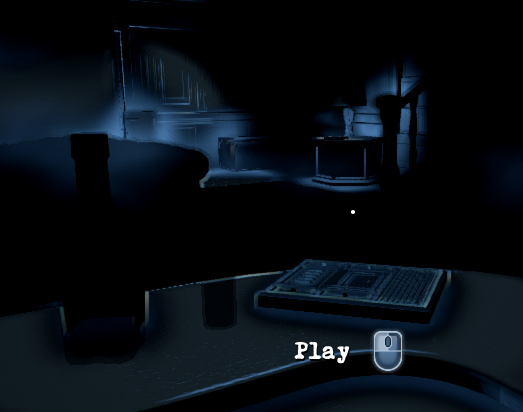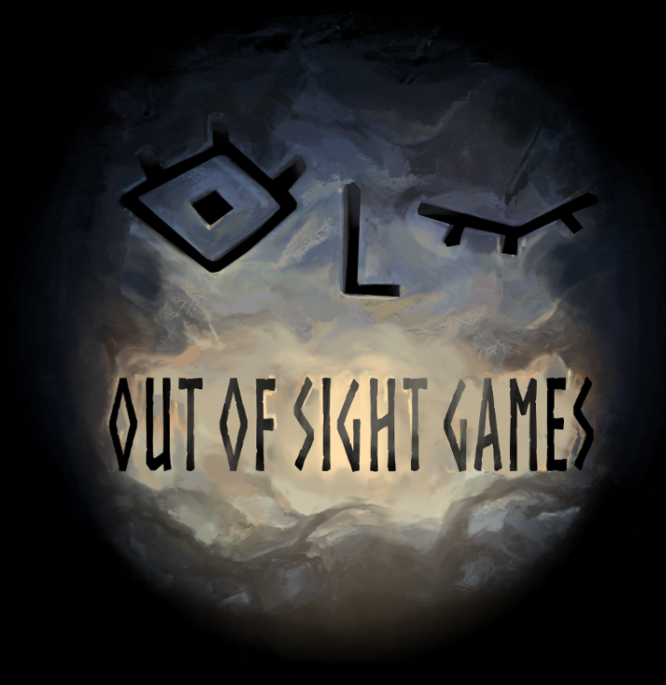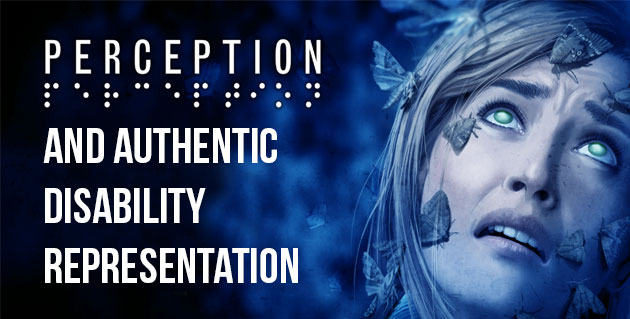Perception is a horror exploration game attempting to bring forth a strong disabled protagonist with an original gameplay style. In this title made by the same developers of BioShock, you play as Cassie, a blind woman who taps her cane on surfaces to see, much like echolocation. When tapping Cassie’s cane, a blue wave emits and briefly shows the outline of the objects in your vicinity. If you tap your cane too much, an evil force is disturbed; you can take cover briefly in one of the hiding locations you come across, like in a wicker basket or under a bed. You also have access to Cassie’s cell phone, and can use it to take pictures of different texts, like prescription bottles or cards, and have the accessibility program on the phone read them aloud for you.
It’s rare to find a video game that realistically portrays disability, and abled developers and storytellers often rely on tropes to carry their narrative. With Perception, I was wary of the blind person with echolocation stereotype; but I thought if developers could show a disabled person using accessibility tools to navigate the world and solve mysteries, it would be a step toward normalizing disabled characters in video games. So even if the whole echolocation bit concerned me, I was willing to give it a shot. I backed the digital copy on Kickstarter and waited over a year to finally play it.
I want to point out that I am not blind or have low vision. My disability affects my strength, dexterity, and range-of-motion, so I am going to start with my initial thoughts and access barriers, then bring in the voices of actual blind/low-vision gamers to share their experiences.
Perception reminded me of 7th Guest – and like that vintage game, you walk around a house still inhabited by the spirits and events of those that once lived there. These events play out through recordings you find throughout the abode, and flashes of memory put on by the ghosts. It’s quite chilling at times, especially as you get further into the disturbing details of the story. Overall, as a game alone, it’s interesting and short enough to keep your attention. The characters and plot didn’t stay with me like other games in the same genre; what stuck with me, though, was the disability content.
Accessibility wise, there’s a lot to be desired. There are no options to remap the keys, which can make certain games unplayable for me. [Update: a patch was made, so now keys are remappable.] Perception has the standard WASD and left click, but I wanted to attach the cane tapping to a side mouse button rather than the spacebar. Most of the in-game dialogue has subtitles, which you can adjust to any size, but the action text is still minuscule and hard to read.

Elsa Sjunneson Henry, a friend of mine who is blind and hard-of-hearing, encountered accessibility issues in the core mechanics. Elsa states, “the speed at which [objects were] fading away was too fast for me to actually play.” In the time it would take Elsa to take in the surroundings, the images were already gone. And I think the way the game portrays echolocation in this way is false – because it ignores memory. When you tap a cane or make a noise, you still know a chair or a desk or a bed is in front of you without having to tap again. Having those images disappear immediately is unrealistic to the blind experience. Elsa goes on to say that “echolocating is an inaccurate term for what we do. As a white cane user, the experience of using Cassie’s cane didn’t resonate at all with me. And I found it more than a little frustrating that they called it how ‘we’ (blind people) see.”
There is a point here I want to stress – the importance of authenticity when depicting disability in games or other media. Some might say that Perception is a horror game and intrinsically unrealistic, so what’s the harm in depicting disability in an unrealistic way?
Well, the media we consume influences how we view society and particularly how we view marginalized communities. False depictions perpetuate stereotypes and lead to further misunderstanding and divide. Authenticity in video games, whether it’s of disability or race or gender, adds to a greater cultural awareness – which we desperately need. In the case of Perception, authenticity should come from reaching out to blind individuals and creating a character and mechanics that are realistic.
Except that’s not what happened.
I was under the impression, before I played the game, that developers did their research with many blind folks. But, in planning this blog post, I discovered that their research was basically wearing a blindfold for a few days; any consulting they did was blind people reaching out to them, and with mixed results. Jesse Anderson, a visually-impaired gamer, approached the developers after learning about their design and told them about all the different, accessible games for blind users. He also talked with them about the representation of Cassie and sent them videos about utilizing a white cane and various apps that blind or low-vision people use to navigate the environment. Some of his ideas and this research Jesse gave them ended up in the game, but I wonder what would have happened if Jesse didn’t approach them, and why developers didn’t already reach out into the community.
The whole “blindfold for a day” approach is problematic and an unsuccessful way to gain any insight into blindness and navigating the world with low vision. Mike Wassel, a blind gamer, explains why:
“Wearing a blindfold for a day isn’t going to give you a taste of what it’s like to be blind. It might give you some idea, but doing research with people who have been blind all their lives, or have low vision, would have been better. This way, you can get feedback from them, and at the end of the day, you can take those blindfolds off and be right back to where you are. Most blind people don’t use echolocation, or count steps, or do many of the things that I believe sighted people think…I think to get a sense of what it’s like, they’d have to be under a blindfold for way longer than only a day. Even then, they’ll still have memories of what it’s like to be sighted.”

Joseph Bein, President and Creative Lead for Out of Sight Games, also had some thoughts about the depiction of blind people and the developer’s approach and shared this with me:
“I got to chat with one of the developers of this game at GDC—we were walking around, and my wife said, ‘Hey, that game has braille on its sign.’ So obviously I was intrigued. Let me preface by saying that the developers seem great, and I think they have the best of intentions; hence the source of my very mixed feelings. On the one hand, it seems like a really interesting game, and from what I can tell, a well-executed concept. From a purely objective perspective, I want to say kudos on good game design. But here’s the thing: any time a blind protagonist features in a game for sighted players, which blind gamers can’t play, you are essentially commodifying the experience of blind people. You are taking a population that is already underserved, and instead of making a game they can enjoy, which is a very rare thing for them, you’re instead using their experience to make a game that sighted gamers (who have plenty of games made just for them) can enjoy. And it doesn’t feel good to be commodified. I feel the same way about Beyond Eyes—beautifully executed, but again, it turns blind people into a commodity, in a game they’re excluded from. And when I asked the devs about blind accessibility in the game, they said that there may be some ‘accidental accessibility’ for the blind based on the sound design, but that they didn’t feel like they could make a fully realized experience for the blind gamers. So, that’s well and good, but why is it OK to make a fully realized game for sighted gamers, featuring a blind protagonist, in the first place?”
Joseph struck a cord with me here. How often do we see disability used by abled developers or directors or producers to elicit sympathy or to add “flavor” to a script or a character? And how often are their productions fully accessible to the people they portray? For the most part, Cassie in Perception is a fleshed-out character with agency and an interesting story, but many people with low vision or who are blind like Cassie can’t play through that story. Again, devs are excluding disabled people for the sake of plot. And again, disability is stereotyped to the detriment of disabled people.
I want to make clear that I am not ragging on the talents of those who created Perception. I don’t think they harbor any ill will toward the disability community; in fact, I am glad they took on some of Jesse’s suggestions and made an otherwise kick-ass character in Cassie. But regardless of intent, their research methods and lack of outreach tilted toward stereotypes. Ableism is not always vicious, and not always on purpose, but I think it’s important to point these things out and look at them in a broader context.
So what do we do now? How can non-disabled developers avoid this ableist pitfall? There are many ways to tackle this, but I think doing what’s easy is best – reach out to our community. Don’t just go to one source, but talk to lots of disabled people.; each disability is unique, and each person with the same disability is different. Use us as a resource throughout your design process, both as play testers for accessibility reasons, and as consultants about the text (and pay us!). I firmly believe that all developers need to hire disabled playtesters, but if you have disabled characters in your project, you need our understanding and knowledge of disability from the start. The same goes for tabletop games, comics, books, TV, and movies.
We also need more disabled people making games. That means access to technology, access to education, or financial support to get our work out there. If you’re a disabled person in the industry, please reach out – I’d love to share what you do.
I hope developers continue making disabled protagonists in their games. I want to see a wheelchair user exploring a space station, or a person with Down Syndrome fighting monsters in a dungeon. While these proposed settings are fantastical, that doesn’t mean developers should ignore the authenticity of the disability experience. I want my fantasy to have some grounding in reality. I want to look at a disabled character and feel that common bond that I miss out on in most fiction – whether it’s a book or a game. Abled people get to play abled people in games all the time, so when presenting us with a disabled character, it’s vital to get it right.
If you like The Geeky Gimp content, please consider supporting my work through Patreon. For as little as $1 per month, you can help me produce content that promotes disability representation and accessibility in nerdy media.


